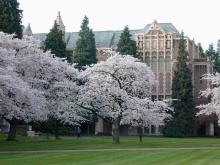The 2008-09 academic year is a special one in the history of the Department of Asian Languages and Literature. In 1908, the year of the Alaska-Yukon-Pacific Exposition, the Board of Regents of the University of Washington established two new departments. One was the Department of Scandinavian Languages and the other the Department of Oriental History, Literature, and Institutions, with Rev. Herbert H. Gowen as its head. This latter department underwent several name changes and reorganizations in the ensuing decades. It is this department that was the precursor of what has been since 1968 our current Department of Asian Languages and Literature, as well as of the Henry M. Jackson School of International Studies and the Department of Slavic Languages and Literature. The current year, therefore, marks the centennial of the establishment on the UW campus of an academic unit devoted to instruction concerning the languages, literatures, and cultures of Asia.
Of course a tremendous amount has changed during the past century. The course offerings the first year of the old department comprised but four courses, on: (1) China, Japan, and Korean, their history, literature and religious systems; (2) European conquests in Asia; (3) the literature of Persia; and (4) the literature, culture, and religion of Mesopotamia. Within a year, courses on the classical literature of Japan, Buddhism, the literature of India, and Semitic archeology, as well as language instruction in Sanskrit and Hebrew, were added. But all in all, the linguistic and cultural coverage of the old department was sparse by today’s standards. In this current centennial year, AL&L provides instruction in ten different languages (Bengali, Chinese, Hindi, Indonesian, Japanese, Korean, Sanskrit, Thai, Urdu, Vietnamese), courses on literature in the original Asian languages and in English translation, classes and seminars on a diversity of topics, including linguistics, religion, philology, cultural studies, and language pedagogy. Undergraduate majors and minors are offered, as well as graduate M.A. and Ph.D. degrees. If Rev. Gowen were alive, he would no doubt be surprised to see the range of topics covered, as well as the amount of student interest in Asian languages and literature.
In this centennial year, the Department has sponsored several events marking the occasion. In November, Professors Zev Handel and Michael Shapiro delivered a centennial lecture to a packed Kane Hall audience on the topic of “A Fire Pot of Tongues: Asian Languages in a New Global Environment.” On April 28, David Knechtges, professor of Chinese literature, delivered the Solomon Katz Distinguished Lecture in the Humanities on “How to View a Mountain in Medieval China.” And on May 7, Norma Field of the University of Chicago presented the 12th annual Andrew Markus Lecture on the topic “What Counts as Literature?—The Astonishing Revival of The Cannery Ship (1929) in Recession-era Japan.” In the months to come, there will be several other events marking the AL&L’s century-long involvement in teaching, research, and service with regard to the languages, literatures, cultures and civilizations of approximately 40 percent of the world’s population.
Alaska-Yukon-Pacific Exposition photo courtesy of University of Washington Libraries, Special Collections, UW28553z.
Back to Asia Notes 2009 Newsletter

